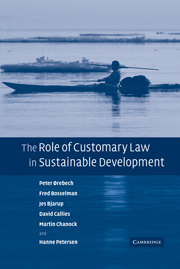Book contents
- Frontmatter
- Contents
- Preface
- Acknowledgements
- Table of cases
- List of international conventions
- Introduction
- 1 The linkage between sustainable development and customary law
- 2 Three case studies from Hawaii, Norway and Greenland
- 3 Social interaction: the foundation of customary law
- 4 How custom becomes law in England
- 5 How custom becomes law in Norway
- 6 Adaptive resource management through customary law
- 7 The place of customary law in democratic societies
- 8 Customary law, sustainable development and the failing state
- 9 Towards sustainability: the basis in international law
- 10 The case studies revisited
- 11 The choice of customary law
- 12 Conclusion: customary law in a globalizing culture
- References
- Index
- Authors index
4 - How custom becomes law in England
Published online by Cambridge University Press: 18 December 2009
- Frontmatter
- Contents
- Preface
- Acknowledgements
- Table of cases
- List of international conventions
- Introduction
- 1 The linkage between sustainable development and customary law
- 2 Three case studies from Hawaii, Norway and Greenland
- 3 Social interaction: the foundation of customary law
- 4 How custom becomes law in England
- 5 How custom becomes law in Norway
- 6 Adaptive resource management through customary law
- 7 The place of customary law in democratic societies
- 8 Customary law, sustainable development and the failing state
- 9 Towards sustainability: the basis in international law
- 10 The case studies revisited
- 11 The choice of customary law
- 12 Conclusion: customary law in a globalizing culture
- References
- Index
- Authors index
Summary
This court will upon a writ of error take judicial notice of all private customs in private places; for they below are as much bound to proceed upon their customs as the Judges here upon the common law. Case 104. Anonymous 11 Mod 68
How that which may be claimed by all the inhabitants of England can be the subject of a custom, I cannot conceive. Customs must in their nature be confined to individuals of a particular description, and what is common to all mankind, can never be claimed as a custom.
Fitch v. Rawling, 2 H.Bl. 393 (1795) at 398;[1775–1802 All ER 571, 574; 126 ER 614, 616[A]ll customs which are against the common law of England, ought to be taken strictly, nay very strictly, even stricter than any Act of Parliament that alters the common law. It is a general rule, that customs are not to be enlarged beyond the usage; because it is the usage and practice that makes the law in such cases, and not the reason of the thing, for it cannot be said that a custom is founded on reason, though an unreasonable custom is void; for no reason, even the highest whatsoever, would make a custom or law; so it is no particular reason that makes any custom law, but the usage and practice itself, without regard had to any reason of such usage; and therefore you cannot enlarge such custom by any parity of reason, since reason has no part in the making of such custom … but the law allows usage in particular places to supersede the common law, and is the local law, which is never to be extended further than the usage and practice, which is the only thing that makes it law.
Arthur v. Bockenham, 11 Mod. 148 (1707) at 160–161- Type
- Chapter
- Information
- The Role of Customary Law in Sustainable Development , pp. 158 - 223Publisher: Cambridge University PressPrint publication year: 2006
- 1
- Cited by



